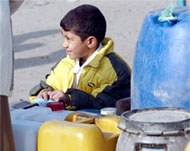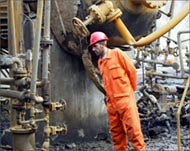Iraqi officials consider rationing fuel
Iraq may have the world’s second-largest oil reserves, but top government officials are looking into creating a coupon programme to ration fuel for winter.

Rationing aims to put a dent into the black market sale of oil products “and lead to more equitable distribution for all Iraqis,” Petroleum Ministry spokesman Assem Jihad said.
Since the April 2003 fall of Saddam Hussein’s government, the supply of oil products, especially gasoline, has been effectively, if not officially, rationed.
Iraqis have been forced to stand in lines of up to two hours at the pump to get fuel.
The alternative: Buy gas on the black market, with prices 25 times higher.
While a litre of gas at the pump is 20 dinars (one US cent), on the black market it sells at 500 dinars (33 US cents).
Petroleum Ministry officials have formed a committee aimed at creating a system of coupons to ration petroleum products, especially kerosene used for heating and running power generators.
 |
|
Iraqis have to wait in queues |
“We expect that system to be ready before next October,” Jihad said.
He added that a coupon system had been used successfully in the Kurdish semi-autonomous region.
More cars
The demand for fuel, especially gasoline, has been aggravated by the import of more than one million cars after the fall of Saddam, Jihad said.
Aside from difficulties like getting fuel and water, Iraqis have also to put up with long periods without electricity, which becomes linked to the fuel shortage.
In Baghdad, power blackouts last up to 20 hours a day, at the height of summer with temperatures around 38 degrees Celsius even after sunset.
Legislators have raised the issue in parliament, but often their complaints run so long that Speaker Hajem al-Hassani has to interrupt and demand that they adhere to their allotted three-minute limit.
Accountability
Samira al-Moussaui, a lawmaker with the conservative Shia majority, thinks the government needs to start holding someone accountable for energy shortcomings.
“The government’s first duty is to improve the infrastructure in Baghdad,” said Moussaui.
“We have not asked for anyone to be accountable for this over the last two years,” she said, referring to the period under the US-led administration and the interim government that followed, which ended in May.
 |
|
Iraq’s refineries have been a |
Another legislator, Faridun Abdel Kader, said action was needed now, because “anyone who studies the projects at the Ministry of Electricity will realize that 10 years from now Iraq’s situation will not change”.
“That doesn’t surprise me, because the ministry has been unable even to re-establish the same level of energy supply that existed before the fall of the (Saddam) regime. What does surprise me is our silence in parliament on this important issue,” he added.
Blackouts
According to a recent UN study, three-quarters of Iraqi homes suffer from electrical blackouts.
The blackouts hit the capital especially hard, where they affect 92% of Baghdad’s 1.1 million households.
In a display of rising frustrations, residents of the poor neighborhood of Sadr City recently attacked a government worker who came to demand that they pay overdue electrical bills.
Twenty-nine percent of Baghdad households have bought generators to make do.
But the generators need fuel to operate, and the vicious circle continues.